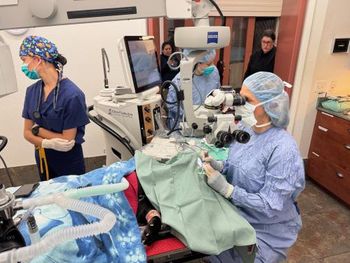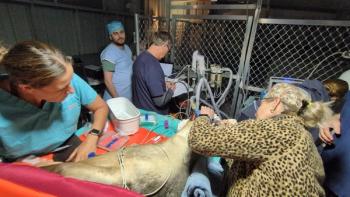
Live from CVC: Beyond IOP: Rethinking glaucoma diagnosis
Glaucoma isn't just about increased intraocular pressure, says veterinary ophthalmologist Dr. Ken Abrams.
Think this eye condition is solely the condition of having increased intraocular pressure (IOP)? Think again, said Ken Abrams, DVM, DACVO, Sunday, May 11, during the CVC in Washington, D.C.
Historically, the definition of glaucoma has been increased IOP in conjunction with loss of vision. However, more recently with the identification of people who have vision loss characteristic of glaucoma patients but have either high normal pressure or even normal IOP, current pathogenesis theories have moved away from the classic teaching of increased pressure damaging the optic nerve and toward neurotoxic mechanisms. Dr. Abrams says that we also see dogs that have lost the first eye to typical primary glaucoma with increased pressure and have transient vision loss in the second eye without documentation of an increased pressure until later in the disease process.
Dr. Abrams says glaucoma may actually turn out to be multiple distinct entities analogous to saying the word infection back in the 1800s before various bacteria, viruses, and fungi were identified. One common denominator is that glaucoma is always an outflow problem where aqueous humor produced by the ciliary body is unable to escape from the eye either by way of the iridocorneal angle after travelling through the pupil or by unconventional uveoscleral outflow. In dogs, 85% to 90% of the aqueous humor exits the eye through the corneoscleral trabecular meshwork at the iridocorneal angle, while only 10% to 15% unconventionally escapes through the ciliary body and into the suprachoroidal space, says Dr. Abrams.
Dr. Abrams emphasizes that a diagnosis of glaucoma should not be based on only a finding of increased IOP. It's extremely important to fully evaluate the eye for clinical signs of glaucoma, even if they are very subtle. These signs might include scleral congestion, corneal edema, dilated pupil, and optic nerve damage. And uveitis, hyphema, an intraocular tumor, or a luxated lens should make you suspect that glaucoma may occur. Chronic changes indicating a permanently blind eye include buphthalmos, severe corneal disease, and Haab's striae (endothelial stretch lines).
Newsletter
From exam room tips to practice management insights, get trusted veterinary news delivered straight to your inbox—subscribe to dvm360.




